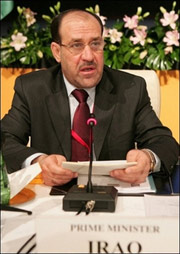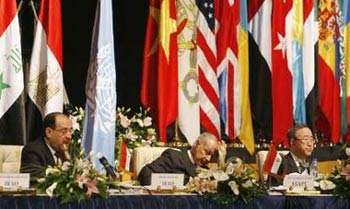| Home / International / International -- International Conferences | Tools: Save | Print | E-mail | Most Read |
| Meeting of International Compact with Iraq Ends with Compact Document |
| Adjust font size: |
A ministerial meeting of the International Compact with Iraq (ICI) came to an end at this Egyptian resort on Thursday afternoon, with the adoption of a final ICI document. The adoption meant the official launching of the U.S.-backed initiative, which was to "build a secure, unified, federal and democratic nation, founded on the principles of freedom and equality, and providing peace and prosperity for its people." The document outlined the details of the ICI, which was deemed as a five-year plan (2007-2011) for both the Iraqi government and the international community. The document enlisted the goals for the Iraqi government to achieve in the next five years in the context of politics, security and socio-economy, and how to realize them in partnership with the international community. The 40-page document didn't mention the timing of withdrawal of foreign troops in Iraq. In the political context, the document said a stable state and coherent society in Iraq required rejection and confrontation of terrorism, renunciation of violence against the state and between sects, fair sharing of resources, and among others. The document said the Iraqi government will widen dialogue to promote unity and national reconciliation.
In the security context, it said the Iraqi government will "work with international partners" to develop well-trained and capable Iraqi security forces. The document said the Iraqi government will develop such security forces before the end of the Compact period, i.e., five years. In the socio-economic context, the document said the Iraqi government will build a transparent and accountable system for management of oil wealth, with a single petroleum account to receive revenues from all crude oil and gas sales. The document said Iraq aims to increase oil output to 3.5million bpd by 2011 and reach refined products output of 700,000bpd in 2011. Regarding international support, the document said the Iraqi government's success in achieving its political, security and economic goals will determine the ability of the international community to invest in Iraq's future. The document said Iraq's real GDP growth in 2006 was 3.0percent, while this year the growth rate will jump to 10.4 percent, further to 12.3 percent in 2008. The ICI was initially launched July 28, 2006, in the hope of creating "a permanent partnership between Iraq and the international community" to help Iraq in its reconstruction efforts and to pursue political, economic and social development over the next five years. The initiative, with strong support from the U.S., is also based on economic, political and security commitments by the Iraqi government in the next five years. The ICI is chaired jointly by Iraq and the UN, with the support of the World Bank. The one-day ICI meeting gathered senior diplomats from Iraq's six neighbors -- Iran, Turkey, Syria, Jordan, Saudi Arabia and Kuwait -- plus Bahrain, Egypt, the Arab League, the Organization of Islamic Conference and the UN. The representatives from some 60 nations as well as 12 regional and international organizations. Also attending the conference are senior diplomats from the five permanent members of the UN Security Council -- the United States, Britain, Russia, China and France -- and members of the G-8, including Germany, Canada, Japan and Italy. Following the ICI meeting is an extended ministerial meeting of Iraq's neighbors on Friday, with participation of the permanent members of the UN Security Council and representatives of the G8countries. The two-day Sharm el-Sheikh conference is the largest international ministerial meeting on Iraq since the U.S.-led coalition forces seized Baghdad in April of 2003. It is the second time for Sharm el-Sheikh to host an international conference on Iraq. In November of 2004, the resort held a similar, though smaller-scale, ministerial meeting, which gathered senior diplomats from about 20 nations and regional and international organizations. |
| Tools: Save | Print | E-mail | Most Read |
 |
| Related Stories |
| New FM on 1st Int'l Mission |
| Al-Qaida Chief in Iraq Dead |
| Iraq Conference to Discuss Political Process, Economy, Security |
 |
 |
|
 |
| Links |

